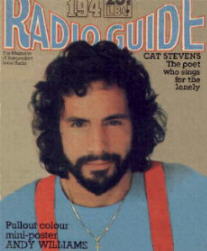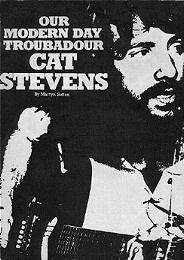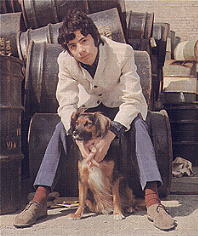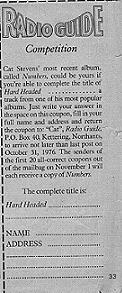This article comes courtesy of my pen-pal Olive
George who sent it to me in the late 1970's. This British Magazine was in
association with the LBC Radio Stations in England. I hope you enjoy this article, it is a
really nice review of Cat Stevens musical career.
- Radio Guide
- October 1977

- OUR MODERN DAY TROUBADOUR
- by Martyn Sutton

- CAT STEVENS ALBUMS
- Matthew and Son (Deram) 1967
- Mona Bone Jackson (Island) 1969
- Tea for the Tillerman (Island) 1970
- Teaser and the Firecat (Island) 1971
- Catch Bull At Iour (Island) 1972
- Foreigner (Island) 1973
- Buddha and the Chocolate Box (Island)
1974
- Numbers (Island) 1975
- Compilations
- The World of Cat Stevens (Decca)
- Cat Stevens’ Greatest II its
(Island)
EXACTLY 10 years ago this
month our cover star Cat Stevens released his first record. The record, released on
Decca’s Deram label on October 1, 1966, was called I Love My Dog and Cat Stevens (or
Steve Georgiou, as he’s known at home) has since become a veritable superstar.
The album that Stevens is
currently recording for Island Records will undoubtedly sound complctely different from
those early hits as Stevens has gone through many changes since he first burst on to the
pop scene at the tender age of 17.
However much he has
progressed, though, Cat Stevens’s music still features some of those early
characteristics apparent on hits like I Love My Dog (1966) and Matthew and Son (1967)
— characteristics such as highly original themes, interesting melodies and complex
rhythms. Cat Stevens has developed from a teen idol into one of pop’s finest singer
/songwriters.
After his initial
successes, Stevens disappeared from the pop scene for a couple of years to recover from
tuberculosis. Like many artists who survive a serious illness, his writing became more
introspective and he developed into a writer who shares his experiences with his audience.
Cat Stevens has recorded
three definitive singer /songwriter albums — Mona Bone Jakon, Tea for the Tillernan
and Teaser and the Firecat— and it is on the rocketing success of these albums that
his career has been built. A sensitive, creative artist, he has usually written about his
own moods, and all through his recording life he has sung songs that thousands of others
could feel as part of their own experience.
He has been called the Poet
o/ Bed-sitter/and, but his appeal is far wider than that suggested by this glib title.
When Stevens loses a lover he tells the world about it in song form, and who has not known
a Lady D’Abanville in his time? This artistic honesty is part of his huge appeal, hut
he is rarely depressing like Leonard Cohen, or actively political like Dylan. Cat Stevens
is a law unto himself. Whether the subject is love (Wild Wor/d) or family relationships
(Father and Son) or social comment (Peace Train), he writes beautiful songs that appeal to
wide audiences.
Another factor in his
success story is his image of a ‘loner’ who walks through life finding and
losing lovers. He is a modem-day troubadour who writes urban poetry for lonely people and
joyously happy songs for happy people.
Cat Stevens has a charisma
that intrigues his audiences, but though he may share his soul on record he is really a
very private man. Not for him C the world of ‘in’ parties, superstar’s a
yachts and expensive cars. He prefers to spend his money wisely, and likes travelling as a
means of gaining artistic freedom.
Most of pop’s major
stars are subjected to enormous pressures, and the a very nature of their art means that
few of them achieve wealth and fame without undergoing some sort of personality crisis.
Our superstars, after achieving material abundance, have to search for something else to
bring reality hack into their lives.
Cat Stevens has had various
traumatic experiences in his life. He has tried to renounce his Greek back-ground,
undergone a serious illness, shaved his head and traveled extensively throughout Ethiopia.
He has fallen in and out of love and investigated many forms of religion. His last album,
Numbers, mirrored his interest in Numerology and no doubt his new album will reveal facets
of his present character and new experiences.
Like any true artist,
Stevens never stands still. It would have been easy to churn out hit singles like
Moonshadow or Morning has Broken, or to carry on making albums in the Teaser and The
Firecat vein. But Cat Stevens prefers to progress as a person and as a writer, which is
why his new album is awaited eagerly by his public.
Cat Stevens has a genius
for writing songs that are relevant to other people’s lives as well as his own. With
one or two exceptions- Foreigner and Numbers for instance — his work is readily
digestible, but he is very subtle in the way he serves up his material. He manages to
combine complex rhythms and simple melody lines- simple lyrics with poetic statements. He
has, in fact, a rare talent for poetic imagery.
Stevens has never
subscribed to the superstar "session men" syndrome. He did use the American sax
virtuoso David Sanborn on his last album Numbers, but he mainly sticks to a nucleus of
musicians who have served him well for the past six years. Stevens’ ego is chandelled
into his . music and he does not appear to have time to show off in the studio in front of
star "guest musicians". Alun Davies, Jean Roussel and Gerry Conway are the men
who have graced his last seven or so albums and they will no doubt he contributing to his
latest offering.
Cat Stevens’s songs
are no longer readily ‘coverable’. They are so stamped with his personality that
not many of his songs are recorded by other artists. In his early days he wrote simple pop
songs and provided hits for the Tremeloes (Here Comes My Baby) and P. P. Arnold (First Cut
Is The Deepest).
His career has gone through
three distinct sections. He has been a "pop star", a
"singer/songwriter", and he is now a major superstar with a large following in
almost all countries. He has achieved so much that it is hard to realize that he is only
28 years old.
Unlike many of his
contemporaries, he can look back on his career with little embarrassment. Matthew and Son
remains a classic pop record; Mona Bone Jackson is one of the finest folk-orientated
singer/songwriter albums ever released in this country, and tracks like Music from his
Buddha and the Chocolate Box album are brilliantly innovative.
His music is constantly
played on radio, but it is hardly music for relaxation. Cat Stevens’ music has to he
listened to. Most of it is full of dramatic tension heightened by his driving guitar work
and unusual singing style. In short, he has style-distinctive style.
When did you last hear of
anybody attempting a Cat Stevens impersonation?
 Radio Guide
Competiton Radio Guide
Competiton
Cat Stevens’ most
recent album, called Numbers, could be yours if you’re able to complete the title of
"Hard Headed…." A track from one of his most popular albums. Just write
your answer in the space on this coupon, mail in your full name and address and return the
coupon to: "CAT" , Radio Guide, PO Box 40, Kettering, Northants, to arrive not
later than last post on October 31, 1976. The senders of the first 20 all-correct coupons
out of the mailbag on November 1 will each receive a copy of Numbers.
The complete title is:
HARD
HEADED…………
NAME…………
ADDRESS………… |